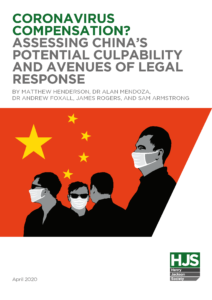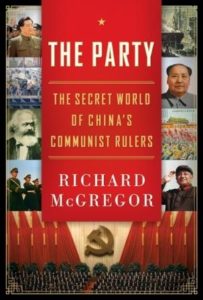The effect of the new national-security law that China imposed on Hong Kong is extending far beyond the territory to American college campuses https://t.co/eydYcm97M3 via @WSJ
— Democracy Digest (@demdigest) August 19, 2020
The Marxist dictatorship that lied to the world about the coronavirus isn’t a safe place these days even for some of its most prominent employees. Chu Han Wong reports in The Wall Street Journal.
A senior ally of Chinese leader Xi Jinping called for a Mao-style purge of China’s domestic-security apparatus last month, saying it was time to “turn the blade inwards and scrape the poison off the bone.”
 The effect of the new national-security law that China imposed on Hong Kong is extending far beyond the territory to American college campuses. Classes at some elite universities will carry a warning label this fall: This course may cover material considered politically sensitive by China. And schools are weighing measures to try to shield students and faculty from prosecution by Chinese authorities, the Journal adds:
The effect of the new national-security law that China imposed on Hong Kong is extending far beyond the territory to American college campuses. Classes at some elite universities will carry a warning label this fall: This course may cover material considered politically sensitive by China. And schools are weighing measures to try to shield students and faculty from prosecution by Chinese authorities, the Journal adds:
At Princeton University, students in a Chinese politics class will use codes instead of names on their work to protect their identities. At Amherst College a professor is considering anonymous online chats so students can speak freely. And Harvard Business School may excuse students from discussing politically sensitive topics if they are worried about the risks.
The US recently announced curbs on China’s Confucius Institutes, an arm of the Chinese Communist Party’s United Front activities, a key dimension of what the National Endowment for Democracy calls Beijing’s sharp power.
— Matt Ho (@mcmchoho) August 17, 2020
Former Community Party School professor Cai Xia has been formally expelled from the Party following a speech she gave online in May, in which she called the party “a political zombie,” China Digital Times adds (CDT published a translation of her talk in June.)
 During her career teaching at the Communist Party’s top academy, Cai Xia cheered on signs that China’s leaders might ease their political grip, making her an uncommonly prominent voice for democratic change near the heart of the party, Chris Buckley writes in the New York Times. Now Ms. Cai has turned her back on such hopes, and the party has turned against her. She has become the latest intellectual punished for challenging Xi’s hard-line policies.
During her career teaching at the Communist Party’s top academy, Cai Xia cheered on signs that China’s leaders might ease their political grip, making her an uncommonly prominent voice for democratic change near the heart of the party, Chris Buckley writes in the New York Times. Now Ms. Cai has turned her back on such hopes, and the party has turned against her. She has become the latest intellectual punished for challenging Xi’s hard-line policies.
It was barely a few years ago that top American politicians conducted foreign policy with the expectation that China would become more like the U.S. as it became more prosperous and increasingly entangled with the world, argues Richard McGregor, author of The Party: The Secret World of China’s Communist Rulers.
Few had the imagination to consider the reverse: that the U.S., and the West, would be forced to become more like China in the new Great Game of strategic competition, he writes for the Lowy Institute:
The implications of China’s rise are still being absorbed in multiple domains, in trade, technology and geopolitics. But the most significant impact may be in how China’s Communist Party-led government is changing global governance more in its own image rather than the other way around. COVID-19 has helped reinforce this trend in the short term. After the initial disastrous cover-up of the outbreak of the virus in Wuhan, the Chinese party-state’s unparalleled, and unchallenged, state capacity has driven infection rates down.







